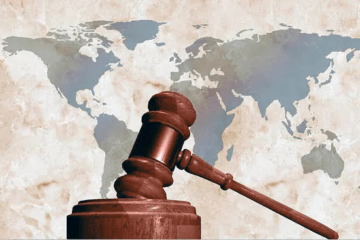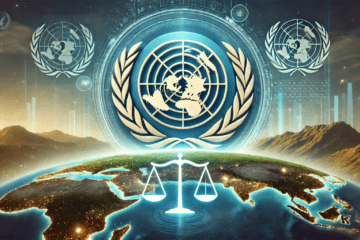
This article is written by Vedant Singla of 1st Semester of Punjab School of Law, Punjabi University, Patiala, an Intern Under Legal Vidhiya
Abstract
The complex interaction of different nations shapes international relations, with a mix of collaboration and competitiveness moulding the ever-changing global scene. This article explores the complexities of global relations, examining the elaborate network of diplomatic, commercial, security-related and cultural interactions that shape the global stage. States must dynamically find a good trade-off between advancing their distinct agendas and promoting the common good of the global community. By establishing partnerships that benefit all parties involved, these agreements promote sustainable economic growth and cultural exchange. Meanwhile, promoting geopolitical disagreement and contrasting beliefs are liable to give diplomatic deadlocks and in extreme scenarios, bloodshed, highlighting the weakness of international harmony. Studying global interactions reveals the underlying forces that influence government decisions through mechanisms like power shifts, alliances and organized systems. Crises like these underscores the intricate network of nations and the need for coordinated efforts. As the world becomes increasingly interconnected through communication technologies and economic interdependence, understanding and managing international relations remain important for achieving peace, stability and prosperity on a global scale.
Keywords: International law, Nations, International cooperation, Global governance, International relations
Introduction
Global interactions are seen by international relations, highlighting the interdependent nature of nation-states and their varied connections. Understanding how nations coordinate and clash globally is central to this concept. As the world becomes more conflicting, acquiring knowledge in international relations assumes paramount importance. The complexities of modern international relations are based upon the strength of interstate collaborations. A thorough grasp of global, political and diplomatic complexities enables individuals to contribute meaningfully to peace-building initiatives. Investigating international relations shows the complexity of worldwide problems including climate change, terrorism and pandemics, highlighting the value of collaborative approaches.
On top of that, international relations offer valuable perspectives on the complex relationships between nations, exposing how international trade and policy choices can influence each other. International relations know how it helps to streamline communication and coordination among nations to address common problems. Encouraging international cultural exchange and human connection is vital for generating an atmosphere of familiarity and cordiality. This discipline investigates the complex interactions between countries, providing valuable knowledge on the forces that govern our interconnected globe. The contemporary landscape underscores the significance of comprehending international relations, as this knowledge is essential for successfully addressing the varied obstacles and possibilities presented by globalization, ultimately leading to harmonious cooperation and collective progress.
Historical context
The journey of international relations has evolved significantly due to past events. Prior to the 17th century, the Westphalian model of governance announced the advent of contemporary nation-states and the idea of state authority. By fostering balance and stability, the Congress of Vienna hoped to reduce the likelihood of conflicts. During this period, two immense conflicts transformed the geopolitical landscape. The Treaty of Versailles after World War I and the establishment of the League of Nations laid the groundwork for international cooperation, while the failure to prevent World War II led to establishment of the United Nations (UN) in 1945. The prolonged confrontation between the two nations left a mark on world politics, leading to the emergence of military partnerships such as NATO and the Warsaw Pact. The shifting of power in mid-century decolonization reconfigured the parameters of international interactions. This historic event drew attention to the dangers of atomic weaponry, inspiring action aimed at limiting their availability. The conclusion of the Cold War led to the showcasing of superpower and the expansion of democratic principles. The fast-paced globalization of the late 20th century was fuelled by expanding trade ties, amplified communication networks and intensified cultural exchange. These issues have emerged as common threats that require collaborative responses. To put it simply, the progression of international relations can be traced through critical events like the emergence of nation-states, significant conflicts, philosophical oppositions and the ascension of global connectivity. Significant historical events have greatly impacted how countries coordinate their interactions, affecting diplomatic relations, joint initiatives and conflict resolution on the global stage.
Key factors
The complex web of factors involved in global affairs spans across multiple categories. Sovereign nations act as key players, using their authority to navigate diplomacy, make vital decisions and join international accords. Interactions between them shape the trajectory of international events. International forums like the UN and WTO offer a valuable opportunity for countries to work together and find solutions to shared problems. The UN, specifically, provides discussions and joint efforts among nations to solve problems including peacekeeping and humanitarian assistance. The WTO oversees trade rules and disputes, providing economic interactions between countries. These civil society groups are rising as key players in global politics. These entities, driven by causes such as human rights, environmental conservation and public health, puts pressure on governments and international bodies to address pressing concerns. The collective actions of these individuals shape legislation, promote learning and encourage global unity. Multinational corporations exert considerable financial support beyond national boundaries, serving as key drivers of globalization. Through their engagement in global trade, MNCs contribute to economic expansion while concurrently providing concerns related to their moral duty towards sustainability and social justice. Their actions may influence the policies of nations regarding labour practices and environmental issues. Key actors in global politics include nations, international bodies, non-profits, interconnected networks and large enterprises. The actions and collaborations among nations and groups influence international decision-making, diplomacy, commerce and social progress, demonstrating the delicate balance of objectives and desires in a globally connected society[1].
Challenges
Global affairs currently confront a variety of difficult issues that require efforts and cooperative approaches from countries globally. Ensuring worldwide stability is essential, as the spread of nuclear weapons threatens balance. The outcome of terrorism persists, fed by fanatical convictions and localized clashes, requiring coordinated efforts. Economic difficulties and trade conflicts create tension in global interactions due to concerns over protectionism, tariff battles and unfair trade practices. These issues highlight the need for balanced and justifiable trade policies that foster collaboration and advance shared interests. These issues demand immediate attention and coordination across national lines.
Rising temperatures, severe weather conditions and depleting natural resources necessitate a united global response to curtail the environmental and social implications. Human rights challenges and humanitarian crises remain, covering from refugee movements to wars. These issues demand integrated and collective efforts to confront violations, protect susceptible groups and ensure the welfare and pride of each individual. Collaborative action among nations and international bodies is crucial for combating global security risks, stabilizing the economy, tackling climate change and protecting human rights. Combined international communities must work together to achieve a safer and more affluent world[2].
Case studies
US-China Relations: The interaction between these two countries has evolved from cooperative stages to more confronting ones, affecting global relations. Trade and common interests initially brought nations together, but down the line, economic differences, IP arguments and territorial claims sparked tensions among them. This complex relationship impacts international trade, security and technology, influencing the strategic balance in the Asia-Pacific region.
European Union: It exemplifies a ground breaking platform in regional collaboration, focused on promoting harmony and economic growth. Despite achievements, challenges persist, including Brexit, economic disparities between member states and migration issues. The EU must effectively address these difficulties while upholding its united identity and shared principles.
Middle East Conflicts: Complex historical, religious and political dynamics are a root cause of the recurring conflicts in the region. Israel’s disputes with nearby countries, combined with issues in countries like Syria and Yemen, have resulted in dire humanitarian situations and political uncertainty. The influence of prominent nations exacerbates the intricacies of addressing past injustices and achieving enduring resolutions.
Paris Accord: This agreement highlights the collective efforts of nations to combat a pressing climate concern. The accord adopted in 2015 has as its primary objective the limitation of global warming to address climate change. The display provides insights into the intricacies of agreements between distinct nations, striking a balance between ecological protection and economic progress and ensuring that parties meet their commitments.
The Individual instances showed the complex nature of international interactions, encompassing economic and geopolitical aspects along with historical influences and global obstacles. They serve as prime examples of the necessity for successful global diplomacy, joint effort and dispute resolution[3].
Role of diplomacy
Complex negotiations are the integral part of diplomacy, which provides constructive international connections. This entity’s advantage lies in its skill to integrate differences by talking things out. Through skilled negotiation and cooperation, diplomacy enables nations to address serious issues, promote collective progress and advance their shared interests with precision and finesse. In the realm of international relations, two main approaches are often distinguished as soft power and hard power. By combining cultural attractions with economic partnerships and diplomacy, nations can wield soft power. In contrast to soft power’s reliance on persuasion, hard power harnesses the authority of brute force and financial resources to accomplish objectives. The art of diplomacy involves using subtle means to shape results via pressure, collaborative dialogue and strategic compromise. The records of diplomatic endeavours include stories of victory and failure. The US-brokered Camp David Accords of 1978 demonstrate the capability of diplomatic efforts in achieving a lasting peace treaty between Israel and Egypt. The failure to prevent World War I and the diplomatic breakdowns leading to conflicts like the Iraq War highlight instances where diplomacy faltered. Diplomacy forms the foundation of international interactions, facilitating cordial existence and mutually beneficial collaboration between states. By synthesizing soft power methods with an analysis of historical triumphs and mistakes, it seeks to devise novel approaches to navigating the intricate network of global interactions[4].
Recent developments
Influence of technology and cyberspace: The landscape of international relations is awaiting momentous changes provided by multiple factors. The exponential growth of technological reach is important. As the reach of digital connectivity grows, nations are struggling to address emerging cybersecurity issues, protect personal information and prepare for potential cyber conflicts. The rapid progress of technology has effectively facilitated direct communication and seamless data exchange, transforming global dialogue and diplomatic efforts.
The increasing prominence of fresh global actors is transforming the global stage, threatening the established hegemony of older players. These two nations are experiencing significant growth, which is shaping geopolitical power structures. This transition alters the distribution of power, necessitating updated global agreements to address shifting authority structures. As time unfolds, it is possible that international partnerships will expand alongside rising divisions. Coordinated attempts could arise to overcome common difficulties. Contrasting objectives and principles may lead to greater fragmentation, resulting in regional coalitions and sovereign states following different tracks. Achieving harmony between collaboration and national priorities will be crucial when navigating this complex situation.
In this dynamic context, co-ordination and invention are crucial for success. As technology, rising powers and effective global management come together, they will shape the future of international relations towards more coordinated cooperation. The fate of world diplomacy rests on nations’ capacity to negotiate important issues and create a course that ensures stability, fosters wealth and protects global concerns[5].
Conclusion
As globalization deepens and our connections become more complex, comprehending international affairs becomes crucial for all. This framework furnishes us with the tools necessary to comprehend the complex nature of global dynamics, empowering us to tackle the diverse obstacles and prospects that define our collective future. International relations emphasize the value of these methods for averting conflicts and maintaining world order. Gaining insight into the various influences that shape a nation’s behavior enables us to foresee patterns, encourage collaboration and prevent possible clashes more effectively. It furnishes people with the necessary insights to participate in meaningful dialogues, advance impactful legislation, and effectuate constructive evolution at the international level. As these obstacles, ranging from climate change to global threats, exceed national boundaries, the need for countries to collaborate has reached at an all-time high. Through teamwork, cooperation and a unified aim for a better tomorrow, countries can collaboratively tackle pressing issues. These collaborative efforts go beyond mere political and economic advantages to foster a realm of greater peace, justice and sustainability for all people. These relations constitute an entrance to form a more desirable planet. By grasping the differences of international relations, we can effect meaningful changes, provide support and create collaborative frameworks that benefit all nations. Realizing the complex web of our interactions and the significance of combined endeavours can help lay the groundwork for a time where countries unite to construct a more cooperative and successful global society.
[1] 2.2 Prominent Actors in International Relations, Pearson Education, https://revelpreview.pearson.com/epubs/pearson_mcdonald-ir-1e/OPS/xhtml/fileP700101634400000000000000000008F.xhtml, last seen on 08/08/2023
[2] The Most Pressing
Foreign Policy Issues, COUNCIL on Foreign Relations, https://www.cfr.org/election2020/candidate-tracker/foreign-policy-issues, last seen on 10/08/2023
[3] The State of U.S.-China Relations, Wilson Center, https://www.wilsoncenter.org/article/the-state-us-china-relations, last seen on 09/08/2023
[4] Anon, The Functions of Diplomacy, E-INTERNATIONAL RELATIONS, https://www.e-ir.info/2011/07/20/the-functions-of-diplomacy/, last seen on 11/08/2023
[5] K. Rajakani, Impact of Economic Globalization on International Relations under the Background of Wireless Communication and Artificial Intelligence, 2022 Wireless Communications and Mobile Computing 1, 6 (2022), https://www.hindawi.com/journals/wcmc/2022/6849387/, last seen on 10/08/2023




0 Comments